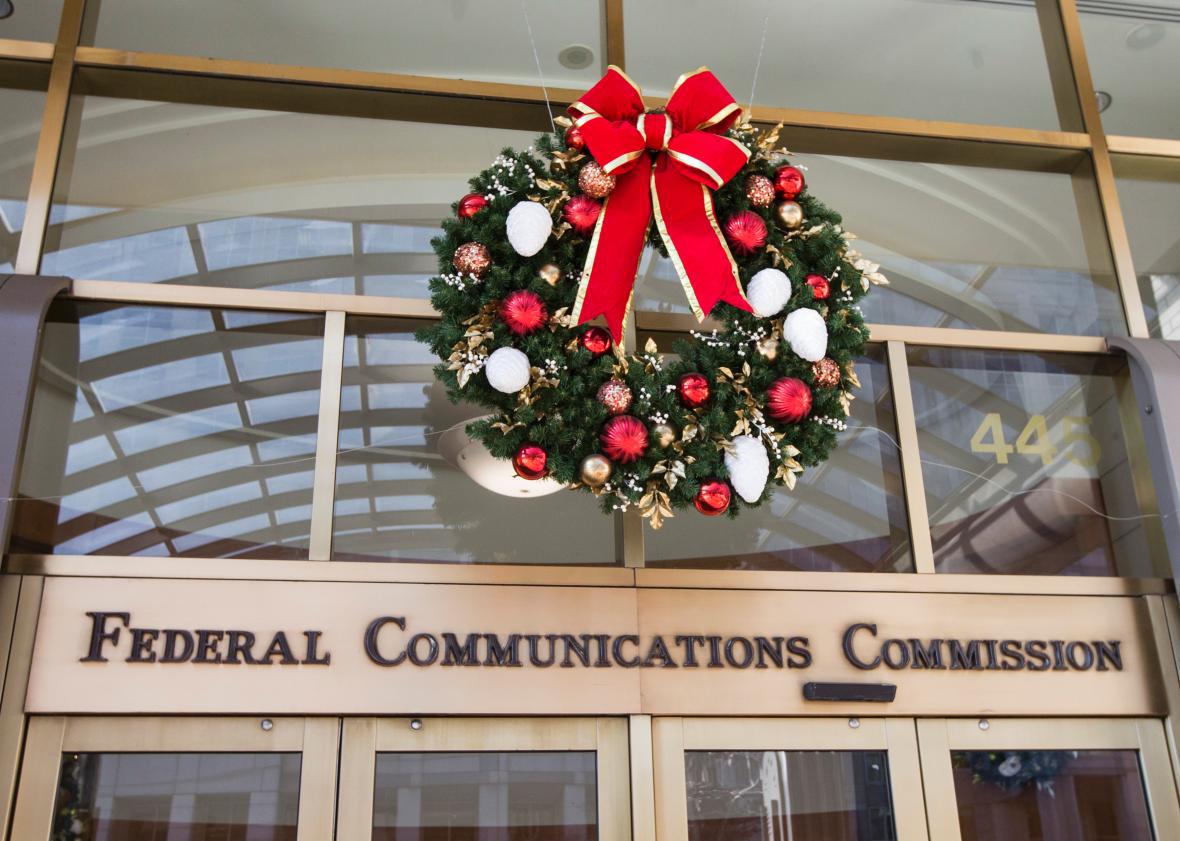It’s not just Democrats who are fuming about the death of the internet as we know it. Republicans in Congress are starting—albeit super late—to speak out against the Federal Communications Commission’s plan to repeal the open internet rules, which is scheduled for a final vote on Thursday. If all goes as expected, the FCC will vote to allow internet providers to block, slow down, or charge websites trying to reach users, and the new rules could go into effect as early as January 2018.
In an interview with Slate last month, FCC Commissioner Jessica Rosenworcel, one of the two Democrats on the commission, argued that before the vote, there should be public hearings on net neutrality. She noted that past Republican FCC chairmen have hosted public hearings on net neutrality during their tenures. Rosenworcel further pointed to multiple serious snafus in the public comment process this year since Chairman Ajit Pai introduced his plan to rescind net neutrality in May.
She now seems to have Republican support for that. On Tuesday, Rep. Mike Coffman, a Republican from Colorado, tweeted a letter he sent asking Pai to delay rush the vote and “hold hearings on the net neutrality issue and to pass permanent open Internet legislation.”
The problems with the process so far include a deluge of comments issued with stolen identities, including those of dead people; a saturation of bots; comments from Russian email addresses that oddly overwhelmingly supported Pai’s plan to kill net neutrality; and a cyberattack on the FCC’s comment system that is currently under investigation by the Government Accountably Office. The FCC’s comment process is currently being investigated by New York state Attorney General Eric Schneiderman, who says his office has found 2 million comments sent to the FCC’s net neutrality proceeding using stolen identities.
On Wednesday, Coffman tweeted at Pai to say he’s “still awaiting a response to my letter yesterday on #NetNeutrality. My staff has called your @FCC office and received no answer.” Other Republicans have voiced opposition, too, but have offered less constructive prescriptions than Coffman. On Monday, Rep. Jeff Fortenberry, a Republican from Nebraska, likewise broke from the Republican pack to voice his support of preserving the net neutrality rules.
And in November, shortly after Pai released his draft of the final rules, Sen. Susan Collins, a Republican from Maine, said in a statement to the Bangor Daily News that she does not support Pai’s plan and that “internet providers must not manage their system in an anti-competitive way that limits consumers’ choices.” That same week, Rep. Dave Reichert, a Republican from Washington, said he supports net neutrality and that he hopes “any action taken will preserve these protections for online consumers and keep the Internet open, free from interference, and make sure it stays a source of innovation and job creation.” And Rep. John Curtis, a Republican from Utah, has also voiced concern over the FCC’s proposal.
But it’ll take a lot more than a few tweets and statements to journalists for Republican opposition to a net neutrally repeal to hold any sway. For one, the FCC will be voting this week to undo the rules, and the inertia is far too strong at this point to have any real chance of stopping that. Thirty-nine senators have now urged the FCC to not go through with its plan, but those were all Democrats.
It’s not that Congress is totally powerless here, though. “If Congress wanted the FCC to not go forward with its repeal, they could walk over there and tell them to knock it off until we have this thing resolved,” said Christopher Terry, a journalism professor from the University of Minnesota who specializes in tech and media policy. “The agencies are lapdogs to Congress; they have to do what they’re told.” He says that Rep. Greg Walden, a Republican from Oregon who chairs the House Energy and Commerce Committee, “could call the FCC in front of his committee and say, Wait till we figure this out. But that’s like saying the moon could crash into the earth today. It’s possible it could happen, but it’s not going to happen.” The House Energy and Commerce Committee oversees telecom issues, but Walden has come out strongly in favor of the net neutrality repeal.
If the committee won’t take action, there’s also something called a congressional resolution of disapproval, where Congress can reverse or eliminate an agency’s action. Since Trump took office, Congress has reversed more than a dozen agency actions—but these were Obama-era rules. This is the opposite situation, since the FCC itself is overturning Obama-era rules.
Furthermore, on Wednesday, more than 100 Republican representatives sent a letter to the FCC in favor of its current trajectory to repeal the open internet rules. And even if Republicans in Congress did take up the issue, though, there’s a chance that they could order the FCC to enact rules that they say will protect “net neutrality” but actually codify some of the same things Pai is looking to do, like allow for throttling from internet providers and charging websites to access users.
Still, the more Republicans who support keeping the open internet rules, the easier it is for other Republicans to do the same. Most likely, the FCC’s net neutrality repeal vote will happen, only to get tied up in court. Even if that happens, the rules would likely still go into effect in 2018. But it does mean that they may eventually be overturned. Fingers crossed.
